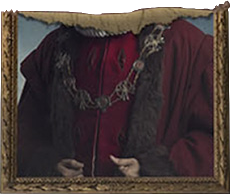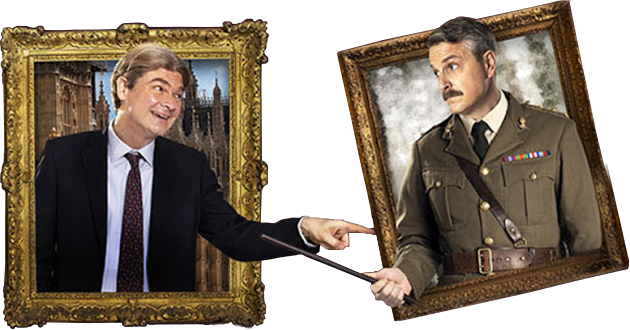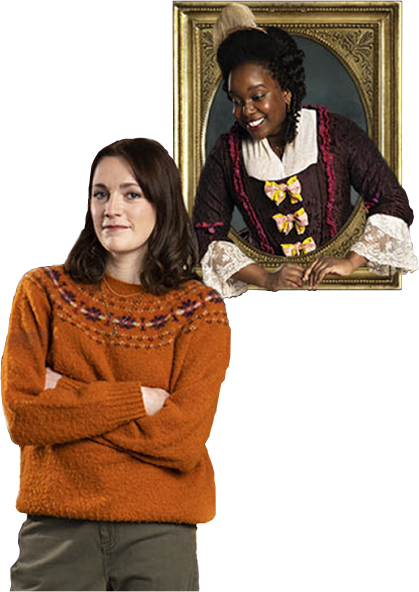
👻If Ascending Wasn't Random…👻
I'd like to first say that I do interpret the ascensions as being random.
I think canon establishes this pretty solidly between the episode with Pat's fake-out not-ascencion and the one with Robin's failed formula for the pattern. I think it being totally random is both the funniest and best way to interpret the whole thing.
But, just for fun, I imagine if it were really about some form of "unfinished business," it wouldn't be as simple as literal unfinished business or mere personal regrets.
Thesis Statement: If ascending really isn't random, I think a strong argument can be made that as far as we can tell from canon, a ghost ascends when the character flaw or trait that caused their death is resolved.
In the show, we only see three ghosts' ascensions: Mary, Annie, and William (The ghost we see with Robin just before Humphrey's death).
Mary's ascension is just after the episode where she finally stands up for herself.
Annie ascends just after becoming best friends with Mary.
William ascends after telling a particularly good joke.
Barring William, whose life we know nothing about, Annie and Mary both seem to ascend right after a significant change their afterlife has allowed that couldn't have happened in their living-life.
Starting with Annie, she's shown to have no real companions in life. She gets spoken to disrespectfully by the men in power, and in turn views them with suitable levels of contempt, and with how little she cares for following the rules of their society we can assume she is probably not well liked by the other Puritan women of the community either.
Eventually, she dies alone, choking on a bread roll that she eats in violation of an enforced religious fast.
Once she dies, of course, she joins the cast of Button House ghosts in the afterlife.
After cultivating a close friendship with Mary (and maybe more--- I absolutely ship it), wherein they support each other in their frustrations with the class of men in power who had free reign to treat women as poorly as they like, we see her ascend while on a friendly walk with Mary.
Therefore, it could be argued that Annie ascended because she overcame the cause of her death: A lack of true friendship.
What would have happened if Annie had had even one friend who supported her in life? A friend she could have broken that fast with in mutual secrecy, a friend who could have prevented her from choking to death trying to scarf down a roll before she was caught and punished?
I believe the same can be said about Mary, too.
Mary's death is totally senseless and predicated on her being a scapegoat for a failed harvest. No one in the village seems to like her, and in life, she was taught not to speak up against others, especially men, so it's clear that she tried to get along just by being herself and being nice to others. Unfortunately, this is not enough to stop the accusations of witchcraft placed on her. After she's deemed odd enough to be an acceptable subject for murder, and enough evidence of her collusion with the devil is fabricated, the entire town seems to join in on her "punishment".
I just can't imagine her speaking up to defend herself during that trial (not that it would have done much good if she had, anyway, but still).
In The Hardest Word however, she finally manages to really tell off the other ghosts (and Alison at the end of the episode!).
She finally, properly learns that being assertive and not nice is sometimes the correct course of action. I would argue she only half-learned this lesson with Annie, since her lessons mostly consisted of insulting men for fun, which is only the first step of truly "freeing [Mary's] voice". So when Annie ascended and Mary lost that support and encouragement, Mary slowly went back to being complacent and fairly subservient, and only recreationally insulting men on occasion.
I definitely think she's channeling Annie's lessons when she finally forms her Being-In-The-Right-Club, and I don't think it's entirely a coincidence that that's the episode just before her ascension. It's in that episode that Mary truly overcomes the trait that helped get her killed--- being unable to properly stand up for herself and flout the opinions of the people in her life who looked down on her for being "odd".
Mary ascended because she overcame the compliance that made her stay in the village, fail to fit in, and eventually get burned as a witch.
(Of course, I'm not saying that merely being assertive would have saved her from an angry mob in a witch trial, but I do think if Mary had had more confidence she might have stood a better chance of survival. Maybe standing up for herself sooner would have made the townspeople realize she isn't so strange at all, and is in fact a very capable farmer and homemaker and a valuable asset to their community. Maybe she could have convinced her husband they weren't wanted in the village in the first place and gone from there. There's no clean solution--- I'm not saying she should've Giles Corey'd it or pulled an Agnes Nutter, but I would also say that fleeing the perceived safety of their village, as dangerous and foolhardy as that would be, is better than a certain death by a rigged witch trial.)
I think applying this framework to the other character's deaths could also be really interesting.
The rest of these are purely conjecture, but...
Robin would need to face his habitual detachment from forming personal bonds that made him unable to convince his fellow tribe members to believe him about the bear instead of shrugging and following along. This would involve mourning Mary (and other ascended ghosts). I think it could also involve processing other traumas, like his mother's face being eaten by wolves. Being the oldest ghost, his coping mechanism for tragedy is to simply ignore it, and while it makes sense to have learned to merely wait for something to hurt less because he's been alive for thousands of years, I think his ascension would be focused around examining why that's not always helpful, especially when the emotional hurt is fresh.
Humphrey would need to face his self-serving mindset. His death resulted from his (literally) terminal affliction to go with the flow, ignore problems, and let things play out as they will. This would involve fully realizing how uncharitable and unhelpful he was with Sophie, and also learning how to take things into his own hands instead of leaving issues to work themselves out the way he did in life as a noble and how he continues to do in his afterlife as a severed head. I think this would probably be instigated by Robin, and they'd have to have a much more in-depth chat about Robin's "friendship" with her and the fact that Robin taught himself French just by listening to Sophie talk, and meanwhile Humphrey couldn't even be bothered to realize how much she resented him.
The Plaguers would have to realize they can't always rely on the in-group, and sometimes that in-group will not serve you properly and you should reach outside your preconstructed social circle. They all died because they trusted Mick too much, largely because he's one of them. They might ascend if they ever properly reconcile their differences with the main cast of ghosts and start living upstairs. I think Agnes would be first to ascend, considering she's already (maybe? Implied to be?) banging Julian.
Kitty would have to overcome her trusting nature and willingness to defer to the opinions of others. Firstly, I don't think anyone took it seriously when Kitty first fell ill. The doctor was only called when she stopped responding. I wouldn't be shocked if someone convinced her it was nothing and she only needed to sleep it off. Also, if Kitty had been less trusting of Eleanor, and less likely to show her sister uncompromising deference, she might have spoken up in reply that the pineapple itself didn't seem prickly, and therefore more importance would be placed on the fact that she was hurt. Then, instead of merely accepting the ridicule she was subject to for saying she got pricked by the pineapple, concern might have been raised for her sudden illness after being pricked further in advance.
Thomas would have to overcome his girl-crazy.
Unfortunately, the way I see it, this would involve Alison reading off a tumblr post about comphet.
Oh fine, I'll take it seriously:
If you want an answer for this that's closer to canon, it's that he has to stop thinking about himself as the male lead in an epic romance poem, and start thinking about himself as a real-life man who faces real-life consequences for his real-life actions. Even if the guy insulting Mary Shelley HAD been talking about Isabelle, like Francis lied about, Thomas still would have died. Even if the steps hadn't been rigged. Plus, Francis' plan only works because he knew Thomas would leap to challenge the guy to a duel because Thomas is an idiot living in romantic literature land where the male lead must put the honor of his beloved above his own life. I don't have very much sympathy for Thomas' death--- You did that to yourself, buddy. Even if your cousin did help your death along.
Fanny's death is interesting to me, because it's steeped in so many layers of irony. Progressivism could have saved her from being prevented from rescuing her family's business with her skills in mathematics. Progressivism could have saved her from being married to a man who did not truly love her just to solve their financial troubles and reputation. And yet, Fanny has dealt with this trauma of being snubbed solely for her gender by doubling down on the morals of tradition and conservatism. Fanny was convinced from a young age that tradition is the way of the civilized world, and progress is the enemy, and I think adhering to this is what eventually resulted in her death. Instead of learning that adherence to tradition is what prevented her from utilizing her mathematical gifts, she convinced herself that it was a good thing because it's simply the way of the world and after all, she did get to marry George. Although I don't think there was much of a chance for her to convince her parents to let her help with the business, I do think that if she had held onto her attempts at feminist thought, her married life could have gone much differently, and her theoretical ascension would likely revolve around unlearning her tendency to care more about social etiquette than the people it affects.
The Captain's death, in my opinion, was mostly caused by the realization that he was a fraud chasing an imagined idea of glory that he didn't do anything to deserve. It was largely about the stolen valor aspect. In order to ascend, he would be forced to overcome his mindset that one must prove themself as a proper soldier and a "good man" to deserve a happy ending. It's tempting to say that his ascension would be related to coming out or his sexual repression, but I think more than that, the Captain views himself as someone who has tried to be Great but has screwed it up at every opportunity. He arrived on the front in WWI to immediately learn the fighting was over, then during WWII he was basically doing nothing of importance, and in the book we even learn he let a German pilot escape capture because he didn't want to arrest a man while he was in his pajamas. More than being closeted, more than being humiliated in front of the man he loved, the Captain's death was brought about by his inability to believe that everyone on Earth is inherently worthy of love just for being a decent person, and no one has to prove themselves deserving of happiness.
Pat would have to learn that one cannot rely on routine alone to guide one's life. A big thing I've noticed about Pat is that for all his leadership capabilities, he rarely if ever has any sort of contingency plan in place. In the companion book, most of his segments are about how he makes a plan for a fun outing or a scouting event and then it all goes to complete shit. Throughout the show, the second something goes wrong, he either makes a blind stab at a solution (which often also fails), or he gets completely frustrated by the break in his idealized routine and gives up. Pat seems to rely on everything going exactly how he planned it in his head, which is also what causes his death: He simply didn't plan to be shot with an arrow.
Julian... Oh, Julian...
I'm so tempted to just say "He would have to stop being a Tory to ascend. And also ascending in his case would actually probably be descending... Okay! Meta over now!"
But for a real answer, I think his death was caused by his tendency to view politics as an opportunity for personal gain. He wasn't a conservative politician because he believed in their cause, he just knew being conservative meant he could ensure policies that benefited him were pushed. He wasn't at Button House to continue a campaign trail, he was there for the after-party (really more of a pre-party). I'm not saying if he became a leftist he'd automatically ascend, btw. That would be extremely trite. The issue isn't just what party he's supporting (though I’d say that is also an issue) but the fact that he doesn't really even believe in most of the (non-economic?) policies he's promoting and is mostly using his position as an MP to be a grifter. So it's less that he'd have to change his political views, and more that that would probably come along with the simple realization that, in general, being too selfish makes your life worse, and not to mention the lives of the people around you. This could maybe possibly perhaps happen if the E-mail he sends Margot in the book is received well and Alison facilitates him meeting Rachel. But it'd be a long shot.
...And that’s about all the baseless conjecture we have room for in this meta post today.





